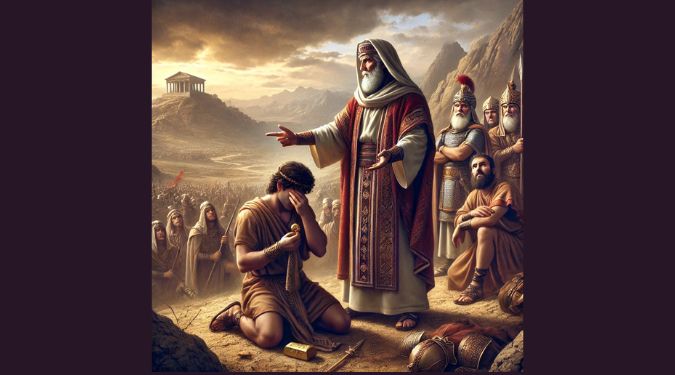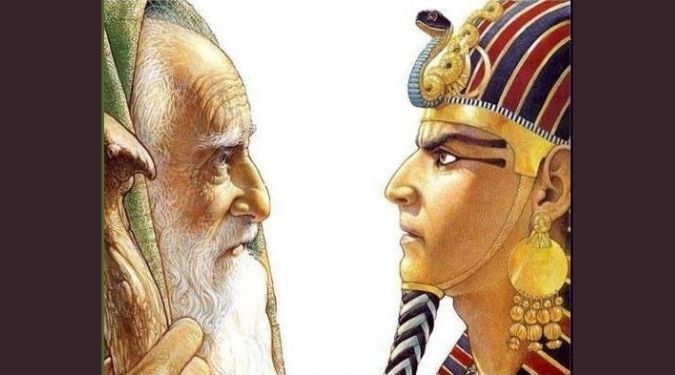I’ve previously discussed the story of timid Gideon, and how God used the modest faith of this unlikely leader to rout the large army of the Midianites. I said then that the Book of Judges was a dark book that proceeds mostly downhill. My starting point in that post was the list of heroes presented by the sacred author in the eleventh chapter of the Book of Hebrews:
What more shall I say? I have not time to tell of Gideon, Barak, Samson, Jephthah, of David and Samuel and the prophets, who by faith conquered kingdoms, did what was righteous, obtained the promises; they closed the mouths of lions, put out raging fires, escaped the devouring sword; out of weakness they were made powerful, became strong in battle, and turned back foreign invaders. Hebrews 11:32-34 NABRE
Today I’d like to dig deeper and try to get to the heart of the purpose of the Book of Judges and St. Paul’s purpose in highlighting these particular heroes by relating a particularly troubling story of another flawed hero on the list, Jephthah.
Jephthah’s Story
Jephthah, pronounced “yif-TAWHK” in Hebrew, was the son of Gilead and a prostitute and was cast out of his father’s house when he was young by his half-brothers, his father’s other sons. He fled to the wilderness where he gathered around him a band of ne’er do wells and brigands. There Jephthah became a well-known fighter and a warlord of sorts.
When the vast army of the Ammonites threatened Gilead, the men of Gilead came back to Jephthah and asked him to fight the Ammonites. Jephthah agreed, but only if the men of Gilead acknowledge him as their leader. They agreed.
Jephthah first tries to negotiate with the Ammonites, but to no avail. Then the Book of Judges records a pivotal event:
“The Spirit of the Lord came upon Jephthah” Judges 11:29a NABRE
Jephthah does something puzzling and ultimately tragic next. He promised God:
“And Jephthah made a vow to the Lord and said, “If you will give the Ammonites into my hand, then whatever comes out from the doors of my house to meet me when I return in peace from the Ammonites shall be the Lord’s, and I will offer it up for a burnt offering.”” Judges 11:30-31 ESV
Jephthah was victorious in his battle against the Ammonites. But then tragedy struck. His daughter, his only child, is the first to greet him upon his return to his home. After a few months’ delay, Jephthah sacrificed his daughter according to his promise.
What’s going on here?
Why is the inspired author of the Book of Hebrews, presumably St. Paul, exalting such a rash and horrifying action? Are we to believe that he forgot the details of Jephthah’s story when he mentioned him in that book?
To find, we have to dig deeper into the very purpose of the Book of Judges and into chapter 11 of the Book of Hebrews.
First, God did not ask Jephthah to make this rash vow, and nowhere in Sacred Scripture is the act commended. Jephthah could not have been ignorant of the fact that human sacrifice was expressly forbidden to Israel. See Leviticus 18:21 and Deuteronomy 12:31.
It is likely that Jephthah never intended to sacrifice a person at all. Biblical scholar Robert Alter writes:
The Hebrew is ambiguous: it could mean “whatever” or “whoever.” Some scholars have argued for the latter because “to meet” seems to imply a person, but the Hebrew, which is in fact a preposition and not a verb, has the sense of “toward,” and it seems unlikely that Jephthah would have deliberately envisaged human sacrifice from the start. In any case, it is a rash vow: the Midrash Tanhuma shrewdly notes that the first creature out of the house could have been a dog or a pig, animals unfit for sacrifice. (Alter 124)
Ironically, The Ammonites, who Jephthah just defeated, were known to sacrifice their children to their false god Molech (Leviticus 18:21).
To What Purpose?
To what purpose could God have allowed such a tragic event to occur? St. Augustine, a 4th and 5th century Church Father and Bishop of Hippo, wrote:
After sixty days, having given such a long delay to his daughter, the Lord did not forbid him from killing his only dearest, as he forbade Abraham, until, having accomplished what he had vowed, he smote himself with a most grievous affliction, but God would never be appeased by the immolation of a man; An example would be left to such a vow, that men might think that they were vowing something great to God, when they vowed human victims, and, what is more terrible, children; or the same vows were not true, but rather feigned, since those who had vowed, as if by the example of Abraham, hoped that God would forbid the fulfillment of such vows. Questionum in Heptateuchum, Book 7,49,7
God did not prevent the sacrifice of Jephthah’s daughter, because if He did, men thereafter might think that sacrificing children was something great.
The Bjook of Judges
In my post on Gideon, I cited the verse that haunts the epilogue of the Book of Judges:
“In those days there was no king in Israel; every man did what was right in his own eyes.” Judges 17:6; 21:25 RSVCE
The Book of Judges paints a clear picture of a dozen inadequate and flawed judges who each deliver Israel from its enemies for a short time and it looks forward to a holy king who will rule Israel. In the near term, and on one level, that is King David. But even David is flawed and inadequate, as we can see by reading about him in the Old Testament. From the perspective of the revelation of the New Testament, and certainly from that of the Book of Hebrews that cites these Old Testament heroes, that holy king is Jesus Christ, son of David.
St. Paul argues that if God rewarded the faith of the flawed heroes of the Old Testament, how much more will he reward our faith now, in Jesus, the fulfillment of all of the promises he made to Israel? There we read:
And all these, though well attested by their faith, did not receive what was promised, since God had foreseen something better for us, that apart from us they should not be made perfect. Hebrews 11:39-40 RSVCE
St. John Chrysostom, a fourth century Church Father and Bishop of Constantinople comments:
Do you see that we have the advantage of them? For God (he says) has provided some better thing for us. In order that they might not seem to have the advantage of us from being crowned before us, He appointed one time of crowning for all; and he that gained the victory so many years before, receives his crown with you. Do you see His tender carefulness? St. John Chrysostom, Homily 28 on Hebrews
God is showing his great care for us in waiting for us to crown these flawed Biblical heroes.
————————————————-
Works Cited
Alter, Robert. The Hebrew Bible. First ed., vol. 2, New York, W. W. Norton & Company, 2019. 3 vols.
“Augustinus Hipponensis – Quaestiones in Heptateuchum.” Augustinus.it, https://www.augustinus.it/latino/questioni_ettateuco/index2.htm. Accessed 17 November 2024.
“CHURCH FATHERS: Homily 28 on Hebrews (Chrysostom).” New Advent, https://www.newadvent.org/fathers/240228.htm. Accessed 10 November 2024.



